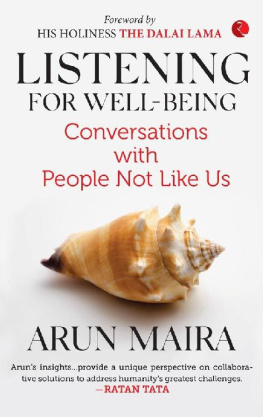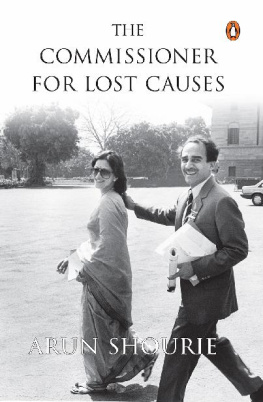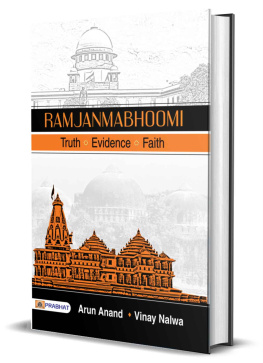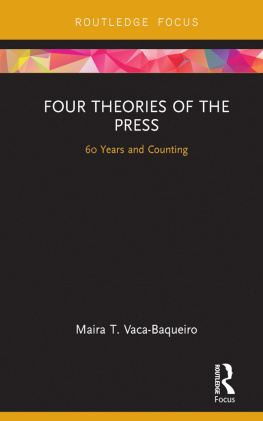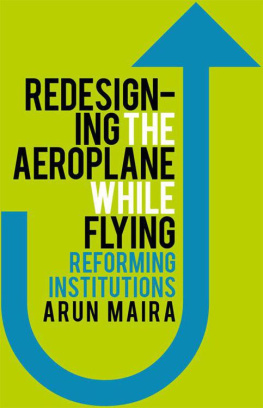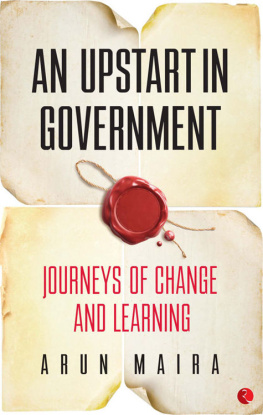Praise for the book
In todays fast-changing world, effective communication has become very important to bring about international understanding. Through Listening for Well-Being , Arun has drawn upon his experiences and encounters to highlight the lost art of listening. Each chapter uncovers a different facet associated with listening, pushing back stereotypes to bring about change through dialogue. His insights, peppered with anecdotes, provide a unique perspective on collaborative solutions aimed at addressing humanitys greatest challenges.
Ratan Tata , Chairman emeritus, Tata Sons
There is a lot that is serious, entertaining, profound and useful in this highly readable book. It ranges over the big, profound questions of the fate of the liberal order or of democracy, while not missing out on the very important minutiae of how tables and chairs need to be arranged to guarantee a dialogue where people not only talk to each other, but listen to each other as well. Read this book and learn how many of our daily problems come from talking but not listening.
Lord Meghnad Desai , British parliamentarian and Chairman, Meghnad Desai Academy of Economics, Mumbai
To look without seeing, hear without listening, and touch without feeling is what we do all the time. Arun Maira tells us what, as a result, we miss out on. To read this book is to open windows where only walls were, doors where only corners stooddank, cob-webbed and cold. It enables us to hear the voices of our times, our peers and our alternatives through the din of our conditionings and the silence of our prejudices.
Prof. Gopalkrishna Gandhi , Former administrator and diplomat, and former Governor of West Bengal
Arun Maira has a great style of making serious points in a casual storytelling way. He tells us why listening to others is so vital. He explains how we can improve the quality of listening to improve the world and our own lives. We must listen to him.
Nobel laureate Muhammad Yunus ,
Founder, Grameen Bank
Also by the same author
Redesigning the Aeroplane While Flying: Reforming Institutions
An Upstart in Government: Journeys of Change and Learning
LISTENING
FOR WELL-BEING
Published by
Rupa Publications India Pvt. Ltd 2017
7/16, Ansari Road, Daryaganj
New Delhi 110002
Copyright Arun Maira 2017
Illustrations by Ritabrata Joardar
The views and opinions expressed in this book are the authors own and the facts are as reported by her which have been verified to the extent possible, and the publishers are not in any way liable for the same.
All rights reserved.
No part of this publication may be reproduced, transmitted, or stored in a retrieval system, in any form or by any means, electronic, mechanical, photocopying, recording or otherwise, without the prior permission of the publisher.
ISBN: 978-81-XXX-XXXX-X
First impression 2017
10 9 8 7 6 5 4 3 2 1
The moral right of the author has been asserted.
This book is sold subject to the condition that it shall not, by way of trade or otherwise, be lent, resold, hired out, or otherwise circulated, without the publishers prior consent, in any form of binding or cover other than that in which it is published.
To my grandchildren
Viren, Aarti and Layla
Listening
It is time to press the pause button; put our smartphones on silent;
Shut out the tweets, trolls and soundbites;
And stop the windmills in our minds.
It is time to listen.
To listen to the whispers in the trees; the caring in our hearts;
And most of all, to the voices of people not like us.
Then, we will learn and find solutions for living together on our shared Earth.
CONTENTS
FOREWORD
I am happy that Mr Arun Maira, a distinguished academician, has written this concise book entitled Listening for Well-Being . As the title says, the book provides insight into the relationship between listening and well-being of individuals.
Indeed, listening is the first of the three wisdom tools in Buddhist tradition, the other two being contemplating and meditating; it is the gateway to improving oneself, both mentally and physically. Listening, without preconceived notion and with respect and full attention, is the way to understand each other. This is the real way to communicate on issues without any distortion.
Through proper listening, followed by proper analysis and practice, one can develop positive attributes like love and compassion. This can lead to inner tranquillity and a peaceful mind. All of these will have an impact on the well-being of individuals as well as society at large. The more we care for the happiness of others, the greater will be our own feeling of well-being.
As long as we live in this world we are bound to encounter problems. If, at such times, we lose hope and become discouraged, we diminish our ability to face difficulties. If, on the other hand, we adopt the right attitude and have a more realistic perspective, it will increase our determination and capacity to overcome challenges. Indeed, with this attitude, each new obstacle can be seen as yet another valuable opportunity to improve our mind!
His Holiness the Dalai Lama
25 May 2017
THE POWER OF LISTENING
To know how to love someone, we have to understand them.
To understand, we need to listen.
Thich Nhat Hanh
I became acutely aware of the transformative power of deep listening 40 years ago. I learned about this power from a Jesuit priest who helped me with a very difficult conflict. I was the youngest member of a team of managers building Indias first indigenous truck factory. I was responsible for the human side of the enterprisefor finding the people we needed; to develop a spirit of continuous learning; and to facilitate a culture of teamwork. My colleagues on the management team, all older and more experienced than me, were responsible for the actual work of planning, building and running the factory.
The engineers and managers at Tata Motors (then known as Tata Engineering and Locomotive CompanyTelco in short) were under great pressure in the 1970s to learn to do things they had never done before. The company went into the business of manufacturing trucks and buses in India in 1954. It acquired the know-how from Daimler Benz of Germany. When the technical collaboration with Daimler Benz expired in 1969, Telco had to develop its technology and expand its business on its own. For this, it decided to put up new facilities in Pune, near Mumbai. These facilities included an R&D centre along with new factories for manufacturing trucks. The project became very challenging because the Government of India, faced with a foreign exchange crunch, curbed the import of machines, press dies, and equipment that Telco needed. Since such machines and dies were not obtainable in India, the company had to manufacture them for itself. Telcos engineers and managers had to learn to do this while they were setting up and running an automobile factory, a challenging task in itself. As one of them said, It seemed they were designing and building an aircraft while they were flying it!




